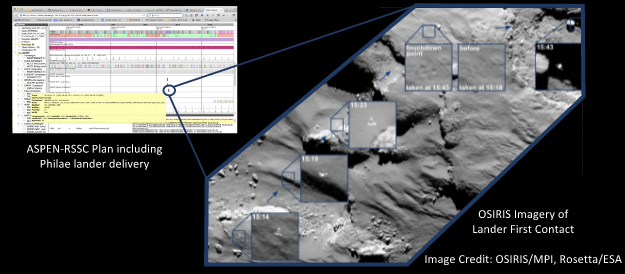Seminario Steve Chien (NASA-JPL) su Planning & Scheduling nella Missione Rosetta
On the 19th of October, during his visit to the PST laboratory, Dr. Steve Chien will provide a seminar on the use of AI techniques for planning and scheduling of space operations in the Rosetta Mission.
Dr. Steve Chien is a Senior Research Scientist at the Jet Propulsion Laboratory, California Institute of Technology where he leads efforts in autonomous systems for space exploration. Dr. Chien has received numerous awards for his research in space autonomous systems including: NASA Medals in 1997, 2000, 2007, and 2015; he is a four time honoree in the NASA Software of the Year competition; and in 2011 he was awarded the inaugural AIAA Intelligent Systems Award. He has led the deployment of ground and flight autonomy software to numerous missions including the Autonomous Sciencecraft/Earth Observing One, WATCH/Mars Exploration Rovers, Earth Observing Sensorwebs, IPEX, and ESA’s Rosetta.
Title: Using Constraint-based Automated Scheduling to Support Rosetta Orbiter Science Operations
Abstract: On September 30th 2016, the European Space Agency’s Rosetta Mission
ended with the Rosetta Orbiter landing on the surface of the comet 67P/
Churyumov-Gerasimenko. While it is well known that this historic
mission was the first mission to deploy a soft lander to a comet
(Philae) and to escort a comet for two years, it was also a pathfinding
space mission from the perspective of Operations and Computer Science in
its usage of the Artificial Intelligence planning and scheduling
software for early to mid-range science activity scheduling and data
downlink scheduling.
I will first provide an overview of the Rosetta mission - including its over one decade journey to the 67P/C-G, and major science discoveries from the mission. I then describe challenging elements of the high tempo, multi-disciplinary Rosetta science planning process which incorporated diverse science, geometric, engineering, and resource constraints. The talk will then present how the ASPEN software was used in the Rosetta operations process to support development of schedules for planning periods of approximately one month covering thousands of observations, over a thousand pointings and slews, over a thousand recorder dumps, and requiring verification of tens of thousands of science and operations constraints.


